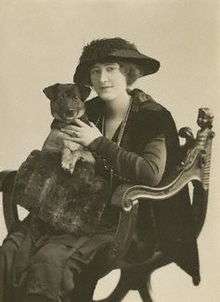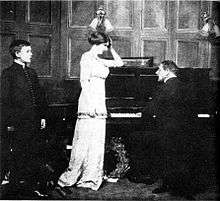Lydia Bilbrook

Lydia Bilbrook (6 May 1888 – 4 January 1990; sometimes credited as Bilbrooke) was an English actress whose stage and film career spanned four decades. Bilbrook appeared in 23 films between 1916 and 1949; she is probably best known to today's audience as the haughty "Lady Epping" in the popular Mexican Spitfire movie comedies (1939-43) opposite Leon Errol.
Life and career

The daughter of Lydia and Robert Walker Macbeth, Bilbrook was born Phillis Lydia Macbeth[1] in Somerset. It is claimed that Bilbrook was an illegitimate daughter of the actor Herbert Beerbohm Tree.[2]
In 1908 she appeared at the Comedy Theatre as Nellie Sellenger to the Mrs Dot of Marie Tempest in Somerset Maugham's play Mrs Dot. The drama critic of The Times judged Bilbrook's performance to be "flirtingly pleasant".[3] In 1911 she appeared at the Savoy Theatre in Where the Rainbow Ends with Charles Hawtrey and a young Noël Coward. The costume she wore in Find the Woman at the Garrick was described at length in an interview with Miss Billbrooke in the Penny Illustrated Paper of 28 September 1912, 'The Most-Talked-Of Dress in England'. In 1913 she played in The Great Adventure at the Kingsway Theatre.[4] She created the role of Alice Hobson in the London production of Hobson’s Choice: A Lancashire Comedy in 1916 at the Apollo Theatre.[5]
Bilbrook married the actor Reginald Owen in 1909;[6] they divorced in 1923. In 1923 Lydia married George Harrison Brown, a journalist known as 'HB', after the birth of his daughter, Blossom, who was registered as the daughter of Reginald Owen. It is believed Blossom died in 1927. HB and Lydia's second daughter Felicity was born in 1928.
In April 1939 Lydia and Felicity went to live in Santa Monica Canyon, close to Reginald Owen and a community of expatriate British actors.
Lydia followed Felicity back to the UK in 1948 and lived most of her subsequent life in Suffolk, near her sister Norma Stoner of Walberswick. She died at Bromham, Bedfordshire in 1990 aged 101.
She appeared in the silent films A Place in the Sun (1916) and Smith (1917).[7] In 1923 she toured America with Cyril Maude and Mabel Terry-Lewis in If Winter Comes, playing at Chicago in April and New York City in the autumn.[8] She remained in America after this tour and went on to appear in various films, including Mexican Spitfire Out West (1940), Dr. Jekyll and Mr. Hyde (1941), Father Takes a Wife (1941), Mexican Spitfire's Baby (1941), Mexican Spitfire at Sea (1942), Mexican Spitfire's Elephant (1942), Mexican Spitfire's Blessed Event (1943), Pistol Packin' Mama (1943), The Spider Woman (1944), Passport to Destiny (1944), The Picture of Dorian Gray (1945), The Brighton Strangler (1945), Mr. Peabody and the Mermaid (1948), and All Over the Town (1949).[7]
References
- ↑ FreeBMD.org.uk Registered June Quarter 1888
- ↑ Lydia Bilbrook on the National Portrait Gallery website, accessed 5 February 2011
- ↑ The Times, 28 April 1908, p. 10.
- ↑ The Playgoer and Society Illustrated, October–November 1913, Vol.9, No.49, listed in Rob Wilton Theatricalia, accessed 5 February 2011
- ↑ Hobson's Choice on the University of Rochester Library website
- ↑ FreeBMD.org.uk, marriage registered June Quarter 1909
- 1 2 Lydia Bilbrooke on the Internet Movie Database
- ↑ "Dramatis Personae", The Observer, 25 February 1923, p. 11
External links
- Bilbrook on Complete Index to World Film
- Bilbrook on the National Portrait Gallery website
- Painting of Lydia Bilbrook with her mother by Robert Walker Macbeth